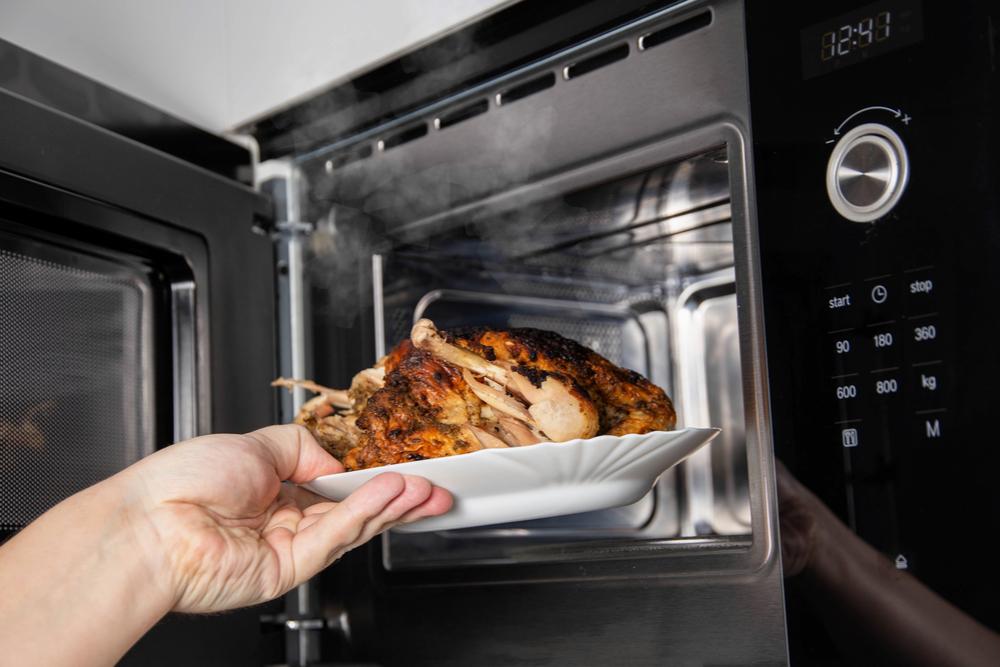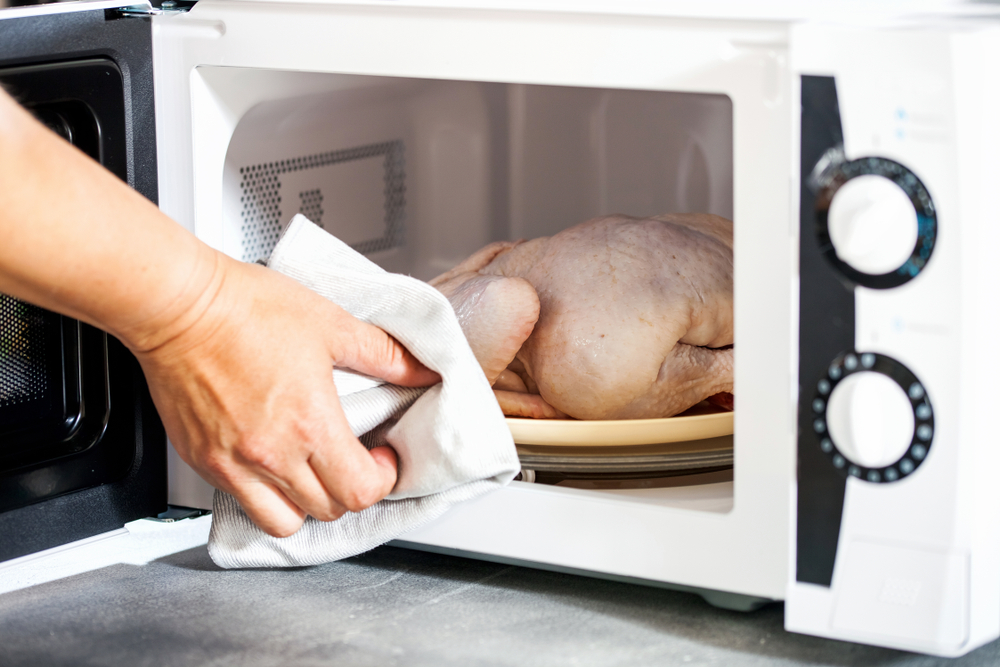If you’ve ever reheated leftover chicken in the microwave, you may have made an unpleasant discovery. The juicy, flavorful dish you enjoyed last night is but a semblance of its former self. So why does microwaved chicken taste bad? And what’s the best way to enjoy your leftovers--or should you even bother keeping them? Keep reading to find out!
Putting chicken meat in the microwave leads to something known as warmed-over flavor. Yep--that weird taste is a real thing. Certain foods that have been subjected to a microwave reheat come out with a cardboard consistency, almost as if they were stale. Last night’s delicious chicken suddenly becomes an unappetizing slab of meat on your plate.
Food scientists will tell you that warmed-over flavor happens to foods high in polyunsaturated fatty acids (PUFAs). The reason is oxygen exposure, which makes the PUFAs in chicken degrade. As a result, the flavor of the meat changes--and as most people can probably attest to, not for the better. Some individuals even describe the meat as rancid.

Reheating Cooked Chicken in the Microwave Gives Chicken a “Warmed-Over Flavor”
Food scientists also agree that certain conditions favor warmed-over flavor more than others. In particular, it becomes more pronounced if the chicken has been in the fridge for at least twenty-four hours and then reheated.
Some foods are more susceptible to warmed-over flavor than others. Chicken is perhaps the most notorious example, but fish is another food to avoid reheating in the microwave. Additionally, the following dishes don’t tend to fare well after microwave reheating:
But don’t abandon your microwave just yet. Some meats like beef or lamb have fewer polyunsaturated acids. As a result, they’re less likely to become stale and tough in the microwave. And many other foods reheat beautifully in the microwave, such as:
By now you might be wondering if microwaving cooked chicken is bad for your health. As long as your chicken hasn’t been sitting in the fridge for too long, it may be ok to microwave. Note that the USDA recommends that raw chicken should be only be in the fridge for one to two days before cooking.

You Can Microwave and Cook Raw Chicken, But the End Product Won’t Be Very Tasty
While there are no food safety issues associated with microwaving process, leftovers should not sit in the refrigerator too long before being microwaved and consumed. While a microwave is somewhat effective at killing bacteria on food, you can’t count on your microwave to kill all bacteria. The microwaving process is often times uneven with hot spots and cold spots in your food. These cold spots can allow bacteria to survive unscathed.
Just make sure that when you’re microwaving chicken that it is safe to eat before being reheated in a microwave.
As far as eating the microwaved chicken is concerned, go for it. If you don’t mind the difference in texture and flavor, nothing is stopping you from putting last night’s chicken breast in the microwave. Just keep in mind that your food will taste different.
Plenty of people like to make big batches of fried chicken or chicken wings. These dishes take time to put together, so it’s best to maximize your effort. However, is it even worth it? Here’s how to reheat chicken for the best flavor.
Changing the way you prepare raw chicken can help you when it comes time to reheat. Use a sauce as part of the recipe, which acts as a barrier of sorts to the air--bonus points if you use rosemary and oregano. These herbs are antioxidants and they protect polyunsaturated fatty acids from oxidation.
Or you can make a sauce for later if you know you’ll be storing chicken to reheat. You can make plenty of fun things, like curry or gravy.
Adding citric acid is another preparation tip that can help you avoid the rubbery chicken phenomenon. Of course, not all recipes allow for citric acid. But if yours does, drizzling vinegar or lemon juice on your chicken can help it maintain its delicious taste when you reheat it.
Be sure to let the citric acid sit covered for a few minutes before cooking, which will help ensure that it doesn’t overpower the over flavors in your recipe. Try buttermilk vinegar or fresh lemon juice for this purpose. These citric acids are less noticeable but still have the desired effect.
How you store your grilled chicken is another deciding factor in whether it reheats nicely or not. Before you rush to dump a big batch of chicken on an uncovered plate in your fridge, think twice.
Remember the discussion above about how warmed-over flavor develops when chicken is exposed to air? This is why you want to take care when storing chicken. Make sure to place your cooked poultry in an airtight container. If it will be a few days before you eat it, you may even want to wrap individual pieces in plastic wrap.
When the time to reheat chicken comes, just say no to the microwave. In general, the best way to reheat chicken is by using the same method you used to cook it. Let’s take a look at a few different methods and how they compare to one another.
When rummaging around in your fridge has revealed a forgotten container of chicken, you might wonder if it's safe to reheat it?
Unfortunately, probably not. If you can’t remember when you put the food in, it’s best to toss it. The USDA recommendation is to eat cooked chicken within three to four days of refrigerating it.
So now you know why it's not the best idea to reheat chicken in the microwave--unless you prefer that stale, cardboard taste, of course. While there are no health risks associated with microwaving leftover chicken, there are better ways to reheat your food. The stove, air fryer, or oven may take longer, but they’ll do your delicious cooking justice.
